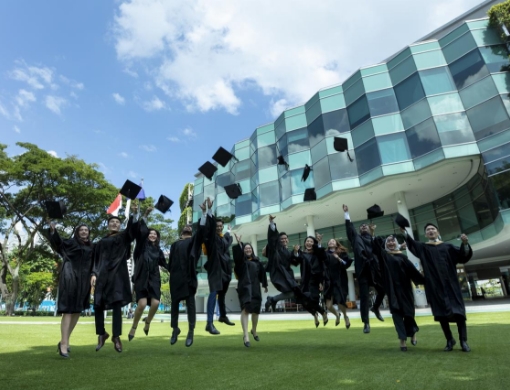The Individualised Major prepares students for the ever-changing world and equips them with the skills to come up with unprecedented solutions to bring meaningful impact to the world around them.
In a world that is increasingly complex, we cannot forecast every disruption and transformation, but we can cultivate students who can connect ideas and perspectives across disciplines, navigate emerging fields of knowledge, possess the agility to master multiple disciplines, and adopt an integrative approach to reframing and addressing today’s and tomorrow’s challenges.
The College of Integrative Studies values the uniqueness of each student, their potential and the societal or industry challenge that they are passionate about. The Individualised Major does not require the student to take any pre-fabricated combination of subjects.

CURRICULUM
The Bachelor of Integrative Studies is a 4-year meritorious honours programme, including the first year on the Deferred Declaration of Degree programme. In total, students are required to complete 36 credit units (CUs) worth of courses. Students on the Deferred Declaration of Degree programme will be invited to apply for the Bachelor of Integrative Studies programme and successful applicants will be enrolled into the programme at the end of their first year.
All Bachelor of Integrative Studies students will choose one of two tracks: professional track and research track. The professional track provides high exposure to industry and societal problems, enabling students to better bridge the gap between their university studies and future employment. The research track involves deep academic inquiry into the subject-matter and is particularly suitable for students with an interest in a policy, research or academic-oriented career.
CORE CURRICULUM (12 CUs)
Capabilities is about tooling up a student with specific competencies and skills necessary to dexterously operate in an increasingly complex, digitised and data-driven working environment.
1. Numeracy (1 CU)
- Calculus
2. Modes of Thinking (1 CU) - Choose 1 Course:
- Critical Thinking in the Real World
- Computational Thinking
- Managing in a VUCA Context
3. Managing (2 CU) - Choose 2 Courses:
- Management Communication
- Business, Government and Society
- Spreadsheet Modelling and Analytics
- Capital Markets in China
- Leadership and Team Building
4. Writing and Reasoning (1 CU)
5. Internship (1 CU)
Click here for details on the Capabilities courses.
Communities aims to help students understand the economic, technological, and cultural systems that structure our interactions with our communities.
1. Economics and Society (1 CU)
2. Technology and Society (1 CU) - Choose 1 Course from the following examples:
- Digital Cultures
- Science, Environment, and Empire
- Technology and World Change
- Climate Change: Global and Local Solutions
-
Science and Technology Studies: Where Science Meets Society
3. Cultures of the Modern World (1 CU) - Choose 1 Course from the following examples:
- Urban Cultures
- Film in Southeast Asia
- Singapore: Imagining the Next 50 Years
- Politics of South-East Asia
-
Foreign Language
4. Community Service (1 CU)
Click here for details on the Communities courses.
Civilisations aims to immerse students in fundamental and perennial debates that cut across time and space, to a critical dialogue between multiple and competing traditions of thought and problem-solving.
1. Ethics and Social / Corporate Responsibility (1 CU)
- Ethics and Social Responsibility for Accounting
2. Big Questions (1 CU)
3. Global Exposure (Non-credit Bearing)
Click here for details on the Civilisations courses.
Capabilities is about tooling up a student with specific competencies and skills necessary to dexterously operate in an increasingly complex, digitised and data-driven working environment.
1. Numeracy (1 CU)
- Calculus
2. Modes of Thinking (1 CU) - Choose 1 Course:
- Critical Thinking in the Real World
- Computational Thinking
- Managing in a VUCA Context
3. Managing (2 CU) - Choose 2 Courses:
- Management Communication
- Business, Government and Society
- Spreadsheet Modelling and Analytics
- Capital Markets in China
- Leadership and Team Building
4. Writing and Reasoning (1 CU)
5. Internship (1 CU)
Click here for details on the Capabilities courses.
Communities aims to help students understand the economic, technological, and cultural systems that structure our interactions with our communities.
1. Economics and Society (1 CU)
2. Technology and Society (1 CU) - Choose 1 Course from the following examples:
- Digital Cultures
- Science, Environment, and Empire
- Technology and World Change
- Climate Change: Global and Local Solutions
-
Science and Technology Studies: Where Science Meets Society
3. Cultures of the Modern World (1 CU) - Choose 1 Course from the following examples:
- Urban Cultures
- Film in Southeast Asia
- Singapore: Imagining the Next 50 Years
- Politics of South-East Asia
-
Foreign Language
4. Community Service (1 CU)
Click here for details on the Communities courses.
Civilisations aims to immerse students in fundamental and perennial debates that cut across time and space, to a critical dialogue between multiple and competing traditions of thought and problem-solving.
1. Ethics and Social / Corporate Responsibility (1 CU)
- Ethics and Social Responsibility for Accounting
2. Big Questions (1 CU)
3. Global Exposure (Non-credit Bearing)
Click here for details on the Civilisations courses.
INDIVIDUALISED MAJOR CORE AND ELECTIVES
Every Individualised Major student will select between the Professional Track, which is targeted towards workplace readiness and industry immersion, or the Research Track, which is suitable for students with an interest in a policy, academia, government, or similar career.
PROFESSIONAL TRACK (16 CUs)
The IM Core is a set of interdisciplinary courses, co-taught by faculty from different disciplines and designed to immerse students in integrative analysis. These include courses such as Interdisciplinary Methods, Introduction to Sustainability: an Interdisciplinary Approach, and Modern Challenges.
SMU provides a broad spectrum of opportunities for students to undertake industry-immersive experiential learning to maximise their learning journey.
Students are required to complete 2 CUs to 4 CUs of SMU-X (including SMU-XO) courses or Work-Study Elective(s), which they may choose from a selection offered across all SMU Schools.
Students may select courses relevant to their self-defined major. These may include additional SMU-X courses.
Each student on the Professional Track will complete a capstone project, which involves an inquiry into an industry or societal problem. The student will be guided by their faculty advisor and an industry mentor during the project. Depending on the scale of the project, this may constitute either 1 CU or 2 CUs.
The IM Core is a set of interdisciplinary courses, co-taught by faculty from different disciplines and designed to immerse students in integrative analysis. These include courses such as Interdisciplinary Methods, Introduction to Sustainability: an Interdisciplinary Approach, and Modern Challenges.
SMU provides a broad spectrum of opportunities for students to undertake industry-immersive experiential learning to maximise their learning journey.
Students are required to complete 2 CUs to 4 CUs of SMU-X (including SMU-XO) courses or Work-Study Elective(s), which they may choose from a selection offered across all SMU Schools.
Students may select courses relevant to their self-defined major. These may include additional SMU-X courses.
Each student on the Professional Track will complete a capstone project, which involves an inquiry into an industry or societal problem. The student will be guided by their faculty advisor and an industry mentor during the project. Depending on the scale of the project, this may constitute either 1 CU or 2 CUs.
RESEARCH TRACK (16 CUs)
The IM Core is a set of interdisciplinary courses, co-taught by faculty from different disciplines and designed to immerse students in integrative analysis. These include courses such as Interdisciplinary Methods, Introduction to Sustainability: an Interdisciplinary Approach, and Modern Challenges.
SMU provides a broad spectrum of opportunities for students to undertake industry-immersive experiential learning to maximise their learning journey.
Students are required to complete any SMU-X course of their choice from a selection offered across all SMU Schools.
Students may select courses relevant to their self-defined major. These may include additional SMU-X courses.
Each student on the Research Track will complete a dissertation, which involves an academic inquiry into the topic of the student’s interest, culminating in a final paper which will be evaluated rigorously based on the standard of a conference paper or journal article. The student will be guided by their faculty advisor for the dissertation.
The IM Core is a set of interdisciplinary courses, co-taught by faculty from different disciplines and designed to immerse students in integrative analysis. These include courses such as Interdisciplinary Methods, Introduction to Sustainability: an Interdisciplinary Approach, and Modern Challenges.
SMU provides a broad spectrum of opportunities for students to undertake industry-immersive experiential learning to maximise their learning journey.
Students are required to complete any SMU-X course of their choice from a selection offered across all SMU Schools.
Students may select courses relevant to their self-defined major. These may include additional SMU-X courses.
Each student on the Research Track will complete a dissertation, which involves an academic inquiry into the topic of the student’s interest, culminating in a final paper which will be evaluated rigorously based on the standard of a conference paper or journal article. The student will be guided by their faculty advisor for the dissertation.
In order to achieve a deeper comprehension of Singapore, students should also acquire knowledge of Singapore's continental context, in particular the complex and dynamic societies in Southeast Asia, and the nearby countries of China and India.
Asia Studies can be fulfilled by a range of pre-identified courses and activities either in the Core Curriculum, in disciplinary curriculum, or co-curricular activities.
Singapore Studies will deepen the students' understanding of the complexities and intricacies of living and working in Singapore, as well as to consider the meaningful impact that can be brought on to encourage the growth and development of Singapore.
Singapore Studies can be fulfilled by a range of pre-identified courses and activities either in the Core Curriculum, in the disciplinary curriculum, or co-curricular activities.
In order to achieve a deeper comprehension of Singapore, students should also acquire knowledge of Singapore's continental context, in particular the complex and dynamic societies in Southeast Asia, and the nearby countries of China and India.
Asia Studies can be fulfilled by a range of pre-identified courses and activities either in the Core Curriculum, in disciplinary curriculum, or co-curricular activities.
Singapore Studies will deepen the students' understanding of the complexities and intricacies of living and working in Singapore, as well as to consider the meaningful impact that can be brought on to encourage the growth and development of Singapore.
Singapore Studies can be fulfilled by a range of pre-identified courses and activities either in the Core Curriculum, in the disciplinary curriculum, or co-curricular activities.
FREE ELECTIVES (8 CUs)
Free Electives encourage students to take any courses to broaden their knowledge in fields beyond their primary major.
Students may take any SMU course (including Accounting Electives) to fulfil the Free Electives component.
ADVISING
Every Bachelor of Integrative Studies student is assigned a faculty advisor who will advise the student in the design of their study plan based on the student’s identified industry or societal challenge. The faculty advisor will provide guidance throughout the student’s candidacy and supervise the student for their capstone project or dissertation.
In addition, every student on the Professional track will also be assigned an industry mentor to help them integrate their coursework learning with real industry applications and understand the context, nuances, complexities and outlook of the industry. Every student on the Research track will be assigned a dissertation supervisor to guide them in academic inquiry.


GRADUATION
Upon successful completion of the programme, students will graduate with a Bachelor in Integrative Studies from SMU, and their academic transcript will reflect the specific names of their individualised majors, for example “Digital Societies” or “Sustainability and Resilience”.
HEAR FROM
INDUSTRY PRACTITIONERS

